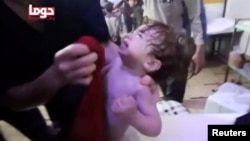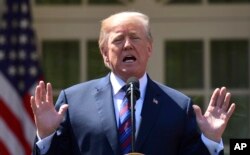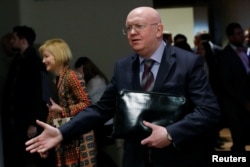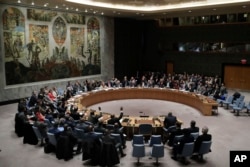Inspectors from an international chemical weapons watchdog are preparing to begin collecting samples Saturday in Douma, Syria, the site of a recent alleged chemical weapons attack blamed on the forces of Syrian President Bashar al-Assad.
While inspectors with the Organization for the Prevention of Chemical Weapons collect soil, biomedical and other environmental samples to determine whether chemicals were used in the attack, the organization will not decide who is responsible.
At least 40 people were killed and hundreds were sickened in the April 7 incident.
While Syria has denied using chemical weapons, Russia — an ally of Syria — accused Britain on Friday of staging a false chemical attack. Russian Defense Ministry spokesman Igor Konashenkov said Britain pressured the White Helmets, volunteers and activists who serve as first responders in rebel-held areas to stage the attack.
The Russian military, Konashenkov said, has "proof that testifies to the direct participation of Britain in the organizing of this provocation." Britain has dismissed the accusation as a "blatant lie."
As Russia warned that a military conflict could erupt with the U.S. over Syria, U.S. President Donald Trump convened his National Security Council on Thursday to discuss a U.S. response and said a decision would be "made fairly soon."
On Friday, U.S. Ambassador to the United Nations Nikki Haley said Trump was still considering his options.
"Our president has not yet made a decision about possible actions in Syria," Haley said at a U.N. Security Council meeting. "But should the United States and our allies decide to act in Syria, it will be in defense of a principle on which we all agree. It will be in defense of a bedrock international norm that benefits all nations."
Amid speculation that a U.S.-led strike conducted with several allies on multiple Syrian targets could be imminent, Trump publicly warned Russia that "missiles will be coming to Syria" before insisting on Twitter that he "never said when an attack on Syria would take place."
Although Russia warned of a conflict with the U.S., it has also called on all parties involved in Syria to refrain from actions that could destabilize the region.
"We hope that ... the U.S. and their allies will refrain from military action against a sovereign state," said Russian Ambassador to the U.N. Vassily Nebenzia. "You understand that the danger of escalation is higher than simply just Syria, because our military is there on the invitation of the Syrian government."
Asked about the possibility of war between the U.S. and Russia, Nebenzia said, "We cannot exclude any possibilities, unfortunately, because we saw messages coming from Washington. They were very bellicose."
U.S. officials have acknowledged the risk of retaliation drawing Washington and Moscow — both of which have troops in Syria — into direct military conflict.
"We're trying to stop the murder of innocent people," U.S. Defense Secretary Jim Mattis told the House Armed Services Committee on Thursday. But on a strategic level, the question "is how do we keep this from escalating out of control."
According to Aaron Stein, a senior resident fellow at the Atlantic Council, a global affairs think tank in Washington, "It's very clear that the U.S., the French and the British will strike."
Stein predicted in an interview on Thursday with VOA's Russian service that "it's probably coming in the next couple of days and will probably last just a night."
In Moscow, political and military leaders are likely asking themselves "what does the [U.S.] president want, what is he trying to get the Syrians to do or not do, and what is he trying to get the Russians to do or not do," according to Yuval Weber, a global fellow at the Wilson Center's Kennan Institute in Washington.
"That's essentially where we get the chances for miscalculation and actual serious conflict," Weber, also an assistant professor at Russia's National Research University-Higher School of Economics, told VOA's Russian service.
Wayne Lee, Steve Herman, Sam Verma, Fern Robinson, Jeff Seldin and Iuliia Alieva in Washington and Margaret Besheer at the United Nations contributed to this report.








